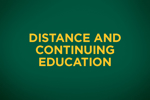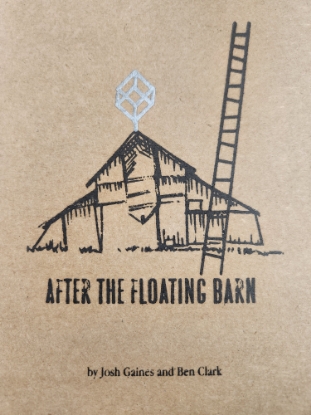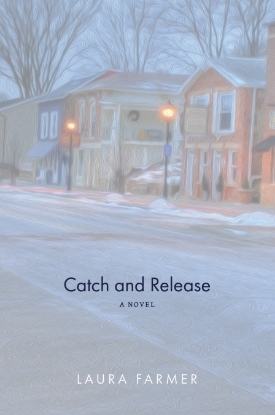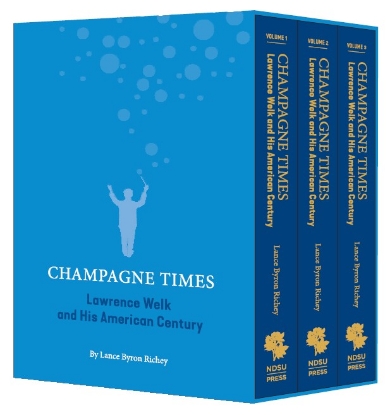New Titles
After the Floating Barn
Winner of the 2025 Poetry of the Plains & Prairies (POPP) Award
Volume 10 of the POPP Award Series
This collection of poems is a narrative, a folk tale, a ghost story, and a loose, speculative history of a strange few acres of land in Nebraska called Art Farm. We wrote it during a two-month-long artists’ residency in 2017.
This book began as a sort of reply to an unpublished chapbook by Ben Clark and GennaRose Nethercott called, Dear Fox, Dear Barn. In that book, The Barn is a character. We began to dissect how the land of Art Farm Nebraska and its inhabitants interacted around that character. On the farm there are multiple structures in a constant state of renewal and decay. Throughout the summer and fall people live and work there, rebuilding and creating. In the winter the weather takes over. The raccoons take over. The ghosts come back. The story goes, sometime in the early 2000s, what would become The Floating Barn was being moved from another farm on huge steel I-beams. When they reached Art Farm, the barn started to shift. Instead of risking further damage they stopped moving and built a trailer-high post foundation beneath the I-beams and reinforced the damaged areas. The building seemed to float there above the prairie, dropping shingles and wall sections until it finally collapsed in a 2018 winter storm. One other structure mentioned directly in our book is a farmhouse built around 1910. Ben and I lived in that house with the mice and mosquitos and attic raccoons for two months. It was amazing.
Catch and Release
Charles “Catch” Sherman has lived at the corner of Fourth and Lafayette—in the house his grandfather built—his entire life. While content in the river town of Beaumont, Iowa, he knows life will be different for his eldest daughter, Edie, a gifted physics student. Set in the late 1950s through the 1970s, Catch and Release is a story about holding on, letting go, and the leaps we must take to become the people we are meant to be.
Champagne Times: Lawrence Welk and His American Century
Over seventy years after his debut on KTLA in Los Angeles, and nearly decades after his debut on ABC in 1955, Lawrence Welk's unprecedented and almost continuous run on network, syndicated, and now public television confirms his place in American entertainment history. From his childhood in a small, German-speaking immigrant community on the North Dakota plains to one of the richest and most recognizable entertainers of his generation, Lawrence's story is a microcosm of the national experience during the American Century.
By telling his story, author Lance Byron Richey came to understand the experience of assimilation and secularization, war and peace, and Depression and prosperity that his generation of Americans lived through in the twentieth century. In the process, the supposedly traditional and timeless values Lawrence mythologized for his audience were revealed as just as time-bound and transient as those of the Baby Boomer generation that supplanted him and his generation as the arbiters of cultural taste.
Most importantly, though, as a man, Richey came to see Lawrence in his moral simplicity and personal complexity, a deeply good and decent man whose family often paid the price for his unquenchable desire for success and security, which his childhood on a North Dakota farm had implanted in him. In short, Welk's story is a quintessentially American story.
The first edition of Champagne Times is limited to five hundred numbered copies, all of which have been signed by the author. The book covers are SKIVERTEX Vellin #5517 blue casing, premium grade, simulated leather material debossed with gold foil. They are designed by Deb Tanner; printed and bound by Thomson Reuters Core Publishing Solutions.
Lance Byron Richey serves as President of the University of Saint Francis in Fort Wayne, Indiana, where he also holds the rank of Professor of Theology. A graduate of Furman University (B.A. in History, 1988) and Conception Seminary College (Certificate of Pre-Theological Studies, 1991), he studied both Philosophy (PhD 1995) and Religious Studies (PhD, 2004) at Marquette University i Milwaukee, Wisconsin; he as published widely in both disciplines. Lance and his wife, Carol, have five children.
LCCN: 2025938196
ISBN: 978-1-946163-76-9
Volume 1: Fire in the Belly (1903-1945), 400 pp., 37 b&w photos
Volume 2: Evening Star (1945-1963), 416 pp., 39 b&w photos
Volume 3: A Rock in the Storm (1964-1992), 424 pp. including 16 color photo pp., 36 b&w photos
Hardcover, packed in slip-case, limited edition, signed and numbered
Publication Year: 2025


























